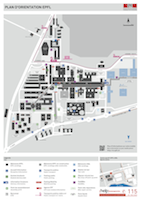Go to
Akash Kumar
Logic synthesis for reconfigurable transistors
 Professor
Professor
Electrical and Computer Engineering
Center for Advancing Electronics Dresden (cfaed)
Technische Universität Dresden
Dresden, Germany
Friday, 29 September 2017 at 11:40 in room BC 420
Abstract:
Silicon nanowire reconfigurable field effect transistors (SiNW RFETs) abolish the physical separation of n-type and p-type transistors by taking up both roles in a configurable way within a doping-free technology. However, the potential of transistor-level reconfigurability has not been demonstrated in larger circuits, so far. In this paper, we present first steps to a new compact and efficient design of combinational circuits by employing transistor-level reconfiguration. We contribute new basic gates realized with silicon nanowires, such as 2/3-XOR and MUX gates. Exemplifying our approach with 4-bit, 8-bit and 16-bit conditional carry adders, we were able to reduce the number of transistors to almost one half. With our current case study we show that SiNW technology can reduce the required chip area by 16 %, despite larger size of the individual transistor, and improve circuit speed by 26 %.
About the speaker:
Akash Kumar received the joint Ph.D. degree in embedded systems from the National University of Singapore (NUS) and the Eindhoven University of Technology (TUe), Eindhoven, The Netherlands, in 2009. He is currently the Chair for Processor Design at the Center for Advancing Electronics Dresden, Technische Universität Dresden, Germany.
His research interests include design, analysis and resource management of low-power and fault tolerant embedded multiprocessor systems. He has published over 100 papers in leading international electronic design automation journals and conferences on these topics. He has received best paper award nominations including SC 2015, DATE 2015 and FPL 2014. He is also a member of technical program committees of major conferences in the design automation and FPGA design area like, DAC, DATE, CASES, ASPDAC, FPL, FPT, etc.
Secondary navigation
- EPFL Workshop on Logic Synthesis and Emerging Technologies
- Luca Amaru
- Luca Benini
- Giovanni De Micheli
- Srini Devadas
- Antun Domic
- Rolf Drechsler
- Pierre-Emmanuel Gaillardon
- Jie-Hong Roland Jiang
- Akash Kumar
- Shahar Kvatinsky
- Yusuf Leblebici
- Shin-ichi Minato
- Alan Mishchenko
- Vijaykrishnan Narayanan
- Ian O'Connor
- Andre Inacio Reis
- Martin Roetteler
- Julien Ryckaert
- Mathias Soeken
- Christof Teuscher
- Zhiru Zhang
- Symposium on Emerging Trends in Computing
- Layout synthesis: A golden DA topic
- EPFL Workshop on Logic Synthesis & Verification
- Luca Amaru
- Luca Benini
- Robert Brayton
- Maciej Ciesielski
- Valentina Ciriani
- Jovanka Ciric-Vujkovic
- Jason Cong
- Jordi Cortadella
- Giovanni De Micheli
- Antun Domic
- Rolf Drechsler
- Henri Fraisse
- Paolo Ienne
- Viktor Kuncak
- Enrico Macii
- Igor Markov
- Steven M. Nowick
- Tsutomu Sasao
- Alena Simalatsar
- Leon Stok
- Dirk Stroobandt
- Tiziano Villa
- Symposium on Emerging Trends in Electronics
- Raul Camposano
- Anantha Chandrakasan
- Jo De Boeck
- Gerhard Fettweis
- Steve Furber
- Philippe Magarshack
- Takayasu Sakurai
- Alberto Sangiovanni-Vincentelli
- Ken Shepard
- VENUE
- Panel on Circuits in Emerging Nanotechnologies
- Panel on Emerging Methods of Computing
- Panel on The Role of Universities in the Emerging ICT World
- Panel on Design Challenges Ahead
- Panel on Alternative Use of Silicon
- Nano-Bio Technologies for Lab-on-Chip
- Functionality-Enhanced Devices Workshop
- More Moore: Designing Ultra-Complex System-on-Chips
- Design Technologies for a New Era
- Nanotechnology for Health
- Secure Systems Design
- Surface Treatments and Biochip Sensors
- Security/Privacy of IMDs
- Nanosystem Design and Variability
- Past Events Archive
On-Line Registration
Workshop registration is mandatory but free of charge. Please click here to go to the on-line registration form.
Thank you very much for your interest in our workshop. Registration is now closed.
Downloads
Presentation slides:
Venue
All talks will take place at EPFL room BC 420. Please click here to go to the interactive EPFL map.

